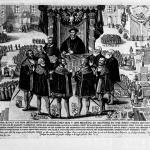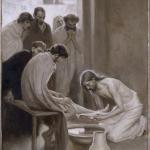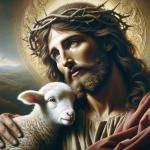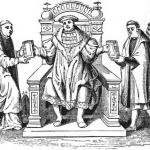The rise of Protestantism allowed many Gnostic ideas to enter the public consciousness. Old, rejected, notions were given a new trial, and many of them ended up being welcomed by the Reformers. While the rejection of ecclesiastical authority and tradition allowed Gnostic thought to return, it must be made clear that there was not a wholesale adaptation of Gnosticism by any one Protestant group. Yet it is easy to see that ontological dualism found within Gnosticism formed the foundation for much of Protestant theology.
What was previously said about Martin Luther can also be said more clearly about Calvinism. One must acknowledge that Calvinism, just like Lutheranism, went beyond the decrees of its founder. Yet, just as Calvin was a far more consistent thinker than Luther, so Calvinism followed the teachings of better Calvin than Lutheranism did with the teachings of Luther. The five points of Calvinism, usually put together under the title of TULIP, provides a good outline of Calvinistic predestination and can show how dualistic Calvin’s thought actually was. First, and most important, is the doctrine of Total Depravity; this serves as the core of Calvin’s dualism. It teaches that human nature is fundamentally evil. Original sin has become a substantial evil, and it is spread throughout the human race. All people, in all parts of their particulars, are evil. Hence, Calvin wrote, “being thus perverted and corrupted in all the parts of our nature, we are, merely on account of such corruption, deservedly condemned by God, to whom nothing is acceptable but righteousness, innocence, and purity. This is not liability for another’s fault. For when it is said, that the sin of Adam has made us obnoxious to the justice of God, the meaning is not, that we, who are in ourselves innocent and blameless, are bearing his guilt, but that since by his transgression we are all placed under the curse, he is said to have brought us under obligation. Through him, however, not only has punishment been derived, but pollution instilled, for which punishment is justly due,” John Calvin, Institutes of the Christian Religion. Trans. Henry Beveridge (Grand Rapids, MI: Eerdmans Publishing Company, 1989), II-I.8. The Calvinistic doctrine of Unconditional Election recreates Gnostic theories of predestination, where only those who are “of the light” can ever be saved, and the only ones who are of the light as those created or predestined to be such by God. “The predestination by which God adopts some to the hope of life, and adjudges others to eternal death, no man who would be thought pious ventures simply to deny; but it is greatly cavilled at, especially by those who make prescience its cause. We, indeed, ascribe both prescience and predestination to God; but we say that it is absurd to make the latter subordinate to the former,” ibid., III-XXI.5. Limited Atonementsufficiently combines these two ideas together. Only a few are chosen by God for salvation, and others have been made for damnation. While God has made all of humanity evil, since humans are the ones who act and do evil, they are the ones guilty of that evil. God is justified in not saving them. Calvin makes it clear that grace, the seed of salvation, is not given at birth (as with the Gnostics) but at God’s free will at some later point in their life. Until then, those who will be saved, live like the rest of humanity in perversity. But when grace is given, the one it is given to will not resist it. They will be saved and nothing will remove this salvation from them. Thus, we see two final notions of Calvinism form, that of Irresistible Grace and the Perseverance of the Saints. “For the elect are brought by calling into the fold of Christ, not from the very womb, nor all at the same time, but according as God sees it meet to dispense his grace. Before they are gathered to the supreme Shepherd they wander dispersed in a common desert, and in no respect differ from others, except that by the special mercy of God they are kept from rushing to final destruction. Therefore, if you look to themselves, you will see the offspring of Adam giving token of the common corruption of the mass. That they proceed not to extreme and desperate impiety is not owing to any innate goodness in them, but because the eye of God watches for their safety, and his hand is stretched over them,” ibid., III-XXIV.10. While there is an undeniable consistency to Calvin’s thought, it is clearly a consistency which requires the fundamental acceptance of an explicit, ontological dualism, the kind which had never before had a home in Christian theology, but had, of course, a definite home with the Gnostics.
However, this is not the only way Gnosticism permeates throughout history. Gnosticism is not just about the dualism between the good and the evil. There is another side of Gnosticism, that is, its insistence of a duality between the spirit and the material world. Ultimately, those who follow this aspect of Gnostic thought end up rejecting either the spirit or the body. The original Reformers knew that was wrong, but many of their followers, who did not think they had to listen to any authority, began speculating. Through such speculation, they slowly brought this spirit-body dualism back. It is not surprising to see this happened. The Reformers created the notion that Catholicism had perverted the Christian message. Later Protestants wanted to work out what all of these errors were. Slowly, newer Protestant sects would be created, and they would find themselves further and further away from the common Christian tradition. In this fashion, the Reformation opened up a universal questioning of orthodox doctrine. Were criticisms of heretical groups like the Cathars justified, or did the Catholic Church try to stomp out the true Christian Church? Various Protestants, like those who would eventually develop Landmarkism, would create lines of Apostolic succession to justify their existence. They would claim that throughout history the true Christian faith existed only as a remnant, and their tradition is the heir of that true Christianity. Many early but marginalized sects would be championed, and this would create an interest in what these sects actually taught. We can see how this would lead to a revival of many long-abandoned heresies.
Religious conflicts, especially when it became outright war, caused more than a few doubts as to whether or not one can actually know religious truth. How can Christianity with its proclamation of love create such a bitter civil war? The different theological doctrines did not really mean much to the general individual. They could not understand the disputes. While an individual person or nation might adhere to one of the developing Christian traditions, or keep to the Catholic faith, the willingness to accept all that one has been told without question by one’s religious tradition has, from this time on, been in the wane. Even if one believes in the general theological presentation of one Christian sect over another, it no longer guarantees complete doctrinal agreement. One person will find one doctrine in dispute, another person a different one, and this questioning allowed for the development of claims to truth beyond one’s religious adherence, first in philosophy and later in the sciences. Culturally, the philosophers took an ever-increasing role in the development of civil society, and with their rise, they helped create the cultural atmosphere people have been socialized into for the last few centuries. But their cultural output has helped bring with it many of the faults and problems inherent with their new hyper-rationalistic methodology.
Descartes, clearly a genius, is always placed at the beginning of modern philosophy and its turn to the subject. While one probably should look back to the renaissance to truly understand the formation of modern philosophy, nonetheless, Descartes’ influence on the world cannot be denied. “I think, therefore, I am – cogito ergo sum,” is the foundation of all modern philosophy. Even though one can trace what Descartes said to Augustine’s criticism of absolute skepticism, Descartes said it in a new environment, which helps explain why Descartes was able to take this foundation into new, unforeseen ways. We know ourselves, we know ourselves as an individual (here we see, even more than in the Protestantism, the foundation of modern rationalistic individualism), and we know ourselves according to our immediate thoughts and ideas far more than we know about anything else, because the rest of the world is mediated to us. Descartes radicalized Platonic skepticism of the senses (of course, coming back with a trust in the God who created the senses to justify adherence to them), and created a rationalistic distinction between the realm of the spirit, that is the realm of consciousness and thought, with the realm of matter. Descartes’ spirit/matter dualism, while it did not completely reject the physical world, nonetheless established the kind of dualism which modernity would follow. Anything with a spirit is of fundamental importance, and anything without that spirit, such as animals, or the rest of the natural world, is expendable and so suitable for any kind of human use. The only way humans could abuse the natural world is if their actions have a consequence on some other spirit-bearing entity, such as another human. Otherwise, one was free to do as one willed over nature. Indeed, he suggested that animals were complex machines without a spirit; the way one treats and uses a machine, such as a printing press, is how one should treat and use animals (cf. Angus Taylor, Animals & Ethics(Orchard Park, NY: Broadview Press, 2003), 35-40). This dualism between spirit and matter, so important to Gnosticism, will become, in turn, important to the development of modern philosophy, and from philosophy, modern society. It should therefore come to no surprise that modern theology follows through with this dualistic turn, and its influences can be felt throughout the theological world, such as when theologians tried to develop and understand the distinction between the supernatural with the natural world and how grace relates to nature. The idea of a pure nature completely outside of the influence of the supernatural existential, while it would never have been understood by in the patristic world, makes some sense when put within this framework.
We should not reject all that philosophers have said and done since the time of Descartes. It is clear that there have been tremendous, important questions and ideas brought up which needed to be established. But it is important to realize that the dualistic worldview taken into philosophy by Descartes has had a profound influence in what happened afterwards. There is no doubt as to the influence of Descartes’ thought in what followed afterwards. Instead of trying to heal the dualistic gap between spirit and matter through an integral, holistic approach, later philosophers widened the gap between the two, eventually creating the need for philosophers to support one side of the chasm over the other. Philosophy, as it were, tried to create a monistic solution to the problem of dualism. After we see philosophers pushing for a spiritualistic solution under the mantle of idealism, we see later, empirically minded philosophers, reject this idealism in favor for outright materialism. Instead of offering any real solution, these rival systems just emphasize the radical spirit/matter dualism lurking behind modernism in all of its guises. They are two sides of the same coin, one easily turning into the other. If we had the time, we could see how this plays out in the history of philosophy. But for the sake of time and space, let us turn to two key philosophers: Hegel and Marx.
Hegel’s philosophy of history can be shown to demonstrate Gnostic sympathies. The dualism between body and spirit finds itself in the rise and development of philosophical thought, with the end point of history and all its development the establishment of the Spirit over all that is matter, because matter is only relative in its existence, while the Spirit is absolute. “For Hegel, everything material remains phenomenal and only finds its truth in the spiritual. The religious ‘dualism’ which distinguishes between pious consciousness and the Absolute is a mere ‘image’ (Vorstellung), which, even in the case of the so-called ‘absolute religion’ of Christianity, has to be rejected in favour of all-encompassing knowledge. Ultimately, for man, there can be no more mystery about the divine Spirit,” Hans Urs von Balthasar, The Scandal of the Incarnation: Irenaeus Against the Heresies. trans. John Saward (San Francisco: Ignatius Press, 1990), 5.
While there are many great philosophers who followed in the footsteps of Hegel, there is no doubt that Karl Marx is one of the most important. More than any other, his questions have helped shape modern society. Much of what Marx criticizes deserved criticism; few can deny the value of the questions he raised. “With great precision, albeit with a certain onesided bias, Marx described the situation of his time, and with great analytical skill he spelled out the paths leading to revolution-and not only theoretically: by means of the Communist Party that came into being from the Communist Manifesto of 1848, he set it in motion. His promise, owing to the acuteness of his analysis and his clear indication of the means for radical change, was and still remains an endless source of fascination,” Pope Benedict XVI, Spe Salvi. Vatican Translation (Rome: November 30, 2007), 20. Marx struggled to find a solution to the problems he saw in the world. Philosophy provided him with two different approaches he could take, that is, one being that of the spirit, and the other empirical materialism. By his time, the spiritual approach seemed to have been tried and failed. Religion, ever interested in the spirit, neglected the problems the ordinary person faced in a day to day basis. Religions suggested that the spiritual world mattered, the physical did not, and so worldly difficulties were more or less unimportant. Hegel was, in this respect, a representative of the religious sentiment when he produced a theory of world history where the goal of history is the transformation of everything into pure spirit. Turning Hegel upside down, Marx went for a totally materialistic approach to world history. The end product of world history which everyone was looking for was not to be found in the realm of the spirit, but in matter. While, like everyone else in his time, he had studied and learned from Hegel, Bulgakov is right in pointing out that is as far as it goes. Only in the sense that he is consciously anti-Hegelian can he truly be seen as being influenced by Hegel. “We believe that the opinion about the significance of Marxism as a ‘transition form’ or dissolution of classical idealism is refuted, first of all, by the fact that Marx himself remained the whole time alien of its influence. […] His Hegelianism did not go much beyond a wordy imitation of the peculiar style of Hegel, so impressive for many people, or go much beyond a few completely casual quotations from Hegel. What do we find in Marx that would relate him spiritually with Hegel, beyond the limits of this superficial imitation?” Sergei Bulgakov, Karl Marx as a Religious Type. Trans. Luba Barna. Ed. Virgil Lang (Belmont, MA: Nordland Publishing Company, 1979), 65-6. Even though Marx is said to follow a “dialectical materialism,” his dialectical approach is different from, and contrary to, Hegel. “Finally, traces of Hegel’s influence on Marx are seen in his evolutionism. However, the idea of evolution in its positivistic understanding is deeply different from Hegel’s dialectics of the concept; just as the external succession of events and situations, even when it obeys an inner law, differs in its ‘factuality’ from self-discovery of the internal, implicit, and given content – a sequence of successive stages of the idea’s self-revelation,” ibid.,69. Marx, in his utopian vision, believed that once the problems were understood, and the political powers which created those problems were overthrown, humanity would move forward and create the idealized paradise we all have been looking for here on earth. “He showed precisely how to overthrow the existing order, but he did not say how matters should proceed thereafter. He simply presumed that with the expropriation of the ruling class, with the fall of political power and the socialization of means of production, the new Jerusalem would be realized. Then, indeed, all contradictions would be resolved, man and the world would finally sort themselves out. Then everything would be able to proceed by itself along the right path, because everything would belong to everyone and all would desire the best for one another,” Pope Benedict, Spe Salvi, 21. Of course, this failure was easily seen by anyone who watched the results of the revolutions, from America and France, to Russia and China. The promised land was never made, nor could it ever be made, if one were to only follow Marx’s materialistic ideology. He might have understood the problem, but the solution was as far away from him as it was those he opposed. Here we can see how Marx helped create a greater rift between religion and science, spirit and matter, than had existed before his time, and this, of course, has had a great amount of influence in religious and philosophical rhetoric after Marx’s time. If Marx emphasized the material world, and looked for its improvement, many will take this as an indication to go the other route, and completely reject any this-worldly eschatology whatsoever. Christian reaction to Marxism would take a further Gnostic turn.
















